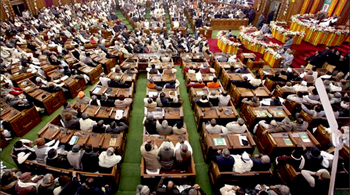New Delhi, Jun 12: The current round of Rajya Sabha biennial elections to 57 seats have given the ruling NDA an edge over opposition UPA, but it still lacks the majority it needs to push crucial legislations and may have to depend on regional parties who remain key players.

After the elections, in the House of 245, the NDA has raised its tally by 5 and now has 74 members. The UPA, on the other hand has 71 members, with its tally down by three.
On June 3, 30 candidates were elected to the Upper House unopposed. The NDA then had managed to add 11 of its members (BJP 7, TDP 2, Shiv and Shiromani Akali Dal one each) in their Rajya Sabha tally.
The House also has 12 nominated members.
The UPA could send five members to the Upper House (Congress 4 and NCP 1) unopposed. The other parties -- JD-U (2), RJD (2), AIADMK (4), DMK (2) and BJD (3) -- were able to send 13 members to the Rajya Sabha unopposed.
In yesterday's election held to the remaining 27 seats, BJP won 12 seats -- two in Haryana, one in UP, four in Rajasthan, two in Madhya Pradesh, one in Karnataka and two in Jharkhand.
Congress, on the other hand, won six seats -- one each in UP, MP and Uttarakhand and three in Karnataka.
Out of 11 seats in UP, the SP won seven seats, BSP 2, BJP and Congress one each.
In the Rajya Sabha bypoll necessitated following the demise of sitting Congress member Praveen Rashtrapal from Gujarat in May, BJP wrested the seat.
With regional players remaining crucial in passage of key legislations, government may now to seek their support to pass reform bills like GST.





Comments
Add new comment